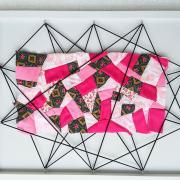One of the world’s foremost carpet experts spins Jo Haywood a colourful yarn about his life as a collector. Photographs by Joan Russell

Andrew Middleton first discovered his deep, life-long passion for antiques while exploring in the attic at the age of ten.
‘My parents had a big Georgian house in Boston Spa and, as my mother had lots of maiden aunts because the war had carried off all the men, we had an attic full of things she’d inherited,’ he explained. ‘My Hornby trainset was also up there and, one day, I decided to do a bit of exploring. I found a whole treasure trove of silver and glass and ceramics. There was even some armour, although quite minor. Pretty much from that moment, I knew I wanted to work in art and antiques.’
His father was a solicitor in Leeds and his mother had what he describes as ‘a fondness for nice things’ but little actual knowledge of antiques. So, he set about teaching himself, with books on antiques added to his birthday wish-list and polite requests for inexpensive pieces at Christmas.
His expertise continued to expand until, in his early twenties, he set off on an over-land journey to India and Afghanistan, at the time a peaceful and intensely beautiful place.
‘It was unlike anywhere I had ever seen,’ said Andrew. ‘It sparked a real passion in me for 14th and 15th century Islamic architecture. It has a grace and elegance that other architecture simply doesn’t have. It’s fair to say that central Asia took a very firm hold on me back then and, to be honest, it’s not really let go since.’
The trip also brought him into close contact with tribal nomadic carpets for the first time too – a life-changing experience for the young antiques enthusiast.
‘My parents had good carpets at home but I was so used to them that I simply didn’t notice them anymore,’ he said. ‘Not all carpets have a story to tell, but the tribal rugs and textiles I came across on my trip really sang out to me.’
When he returned home he bought his first two rugs, for £30 and £70, from a little place in Hyde Park, Leeds. Then he bought a few more. And as his expertise grew, people started asking him for advice on their own purchases and he began selling a few of his finds. But he was determined that his hobby would not become his job.
‘It was my passion, not my career,’ Andrew said. ‘So, I took the decision to work in antiques but not specialise in carpets.’
In 1980, he moved to London, where he quickly established himself as an 18th century furniture specialist. He became a director with Fulham Road-based period furniture dealer Peter Lipitch before moving to Bonhams, where he became associate director in 1996.
He was finally persuaded to put his passion into practice when he moved to Bonhams, setting up the company’s first carpets department. And he also wrote his first book, Oriental Rugs & Carpets, which has subsequently been republished in five further editions.
His work took him round the globe to, amongst others, Beirut and Turkey, where Istanbul soon became his home away from home.
‘I got to know the city very well indeed, perhaps even better than Leeds,’ he said. ‘But then Yorkshire began to call me home again.’
Andrew was actually born in Guildford but has lived in Yorkshire for most of his life and is proud to call himself a Yorkshireman (particularly during the cricket season). So, when he heard Phillips was looking for a valuer in Leeds, he jumped at the chance.
‘I’d lived in London for 20 years and was, inevitably, exhausted by it,’ he said. ‘I just wanted to come home.’
A riverside property in Cawood, between York and Selby, is the home he returned to, and where he has raised a family with his wife Jennifer, a former senior press officer at Bonhams who now runs Lemon Zest, a highly successful PR company.
Their home is a testament to Andrew’s passion for 18th century furniture and tribal carpets and textiles, with walls adorned with tent bands, cradle bags and beautiful, richly-coloured fabrics.
He now works as a consultant for Tennants and runs his own business, Andrew Middleton Fine Art, specialising in valuations for auction, insurance and probate. Among his team of specialists are Susan Rumfitt and Eric Knowles, both perhaps best known for their star turns on the BBC’s Antiques Roadshow.
‘I have a lot of time for the programme because the experts all take their subjects seriously,’ said Andrew. ‘The estimates tend to be a bit on the high side, but I suppose that’s to create a bit of drama for the TV audience. Cash in the Attic and its ilk are not for me though. To be honest, I can’t stand them.’
Despite the perhaps unduly generous estimates offered by TV pundits, Andrew believes people are beginning to understand that prices in the antique world are not what they once were.
‘Historically, it was the case that prices tended to continually creep up, making it more economically viable than the housing market,’ he said. ‘That’s simply not the case anymore and I have never, and would never, encourage someone to invest in antiques for profit. You should buy something because you love it.’
And it’s not just profits that have waned in recent years; the number of people buying antiques and the number of antique shops on the high street have also seen something of a downturn. But Andrew remains largely positive.
‘Unfortunately, the market is dwindling because a great many collectors are elderly,’ he explained. ‘The younger generation – say those between 20 and 50 – are interested in modern art, but when buying furniture they’re not looking for antiques. They’re all about minimalism.
‘But the antiques business will definitely survive. It will inevitably become smaller, but it will evolve and find a whole new way of doing business.’
As the trade he loves enters a new phase, where auction houses launch their own restaurants and start promoting themselves as destinations for family days out, Andrew himself is entering a new phase of life.
‘I’ll be 60 on my next birthday but I have absolutely no intention of slowing down,’ he said. ‘I’ve been doing this for 40 years and I’m still learning. I venture out every day in the constant hope of finding something new and exciting.
‘Why would I stop following my passion when I can still be amazed and – how shall I put it – gobsmacked?’



























